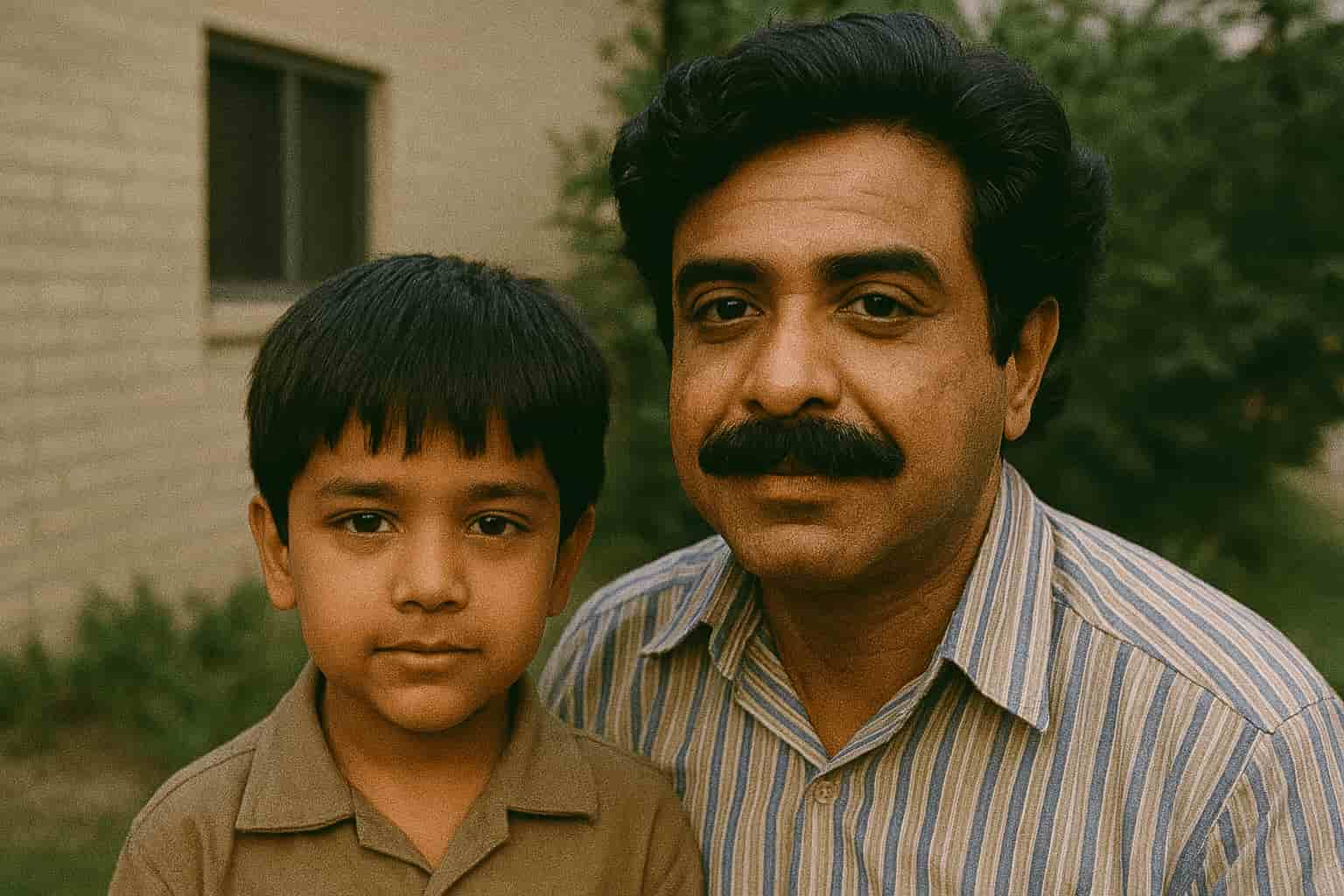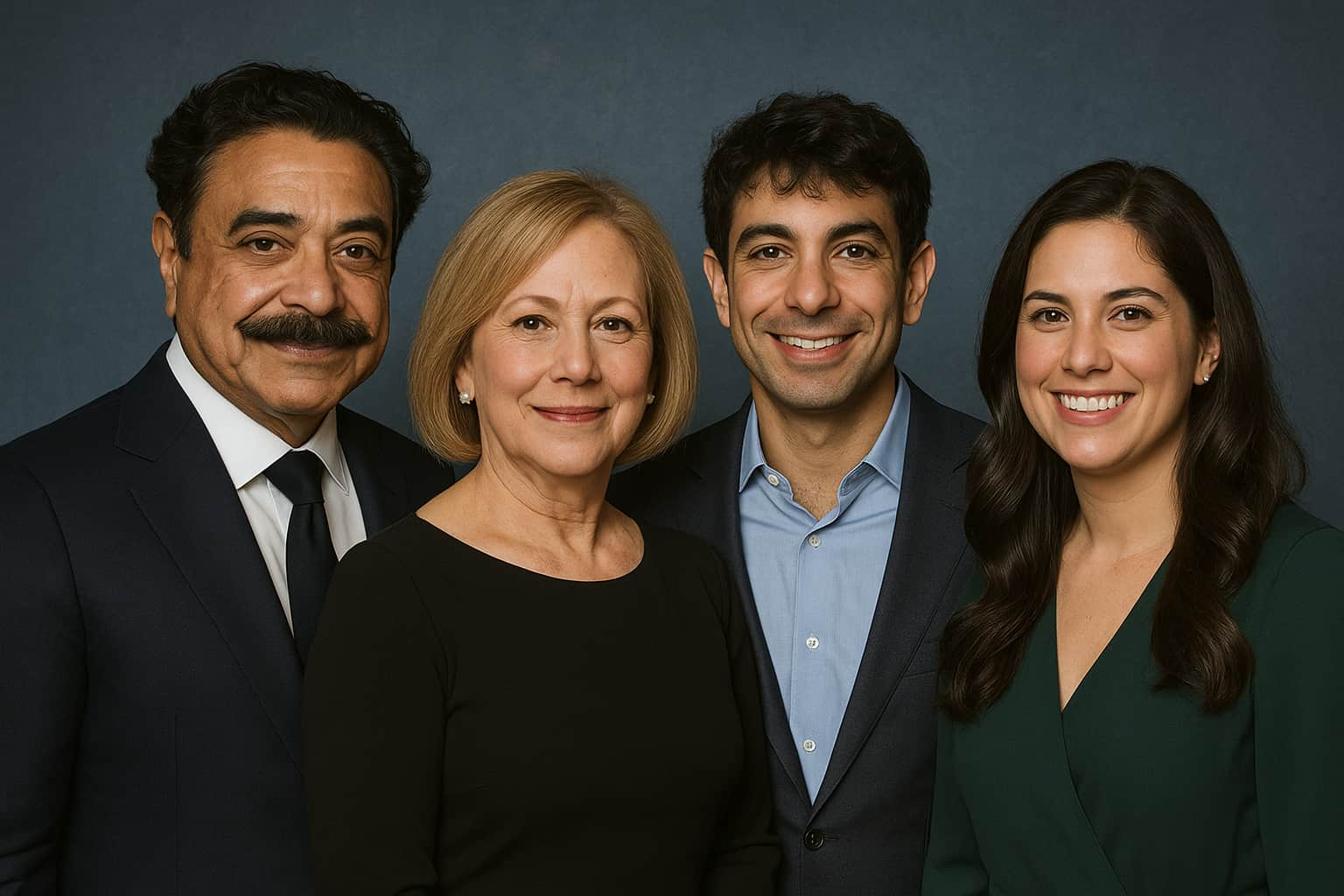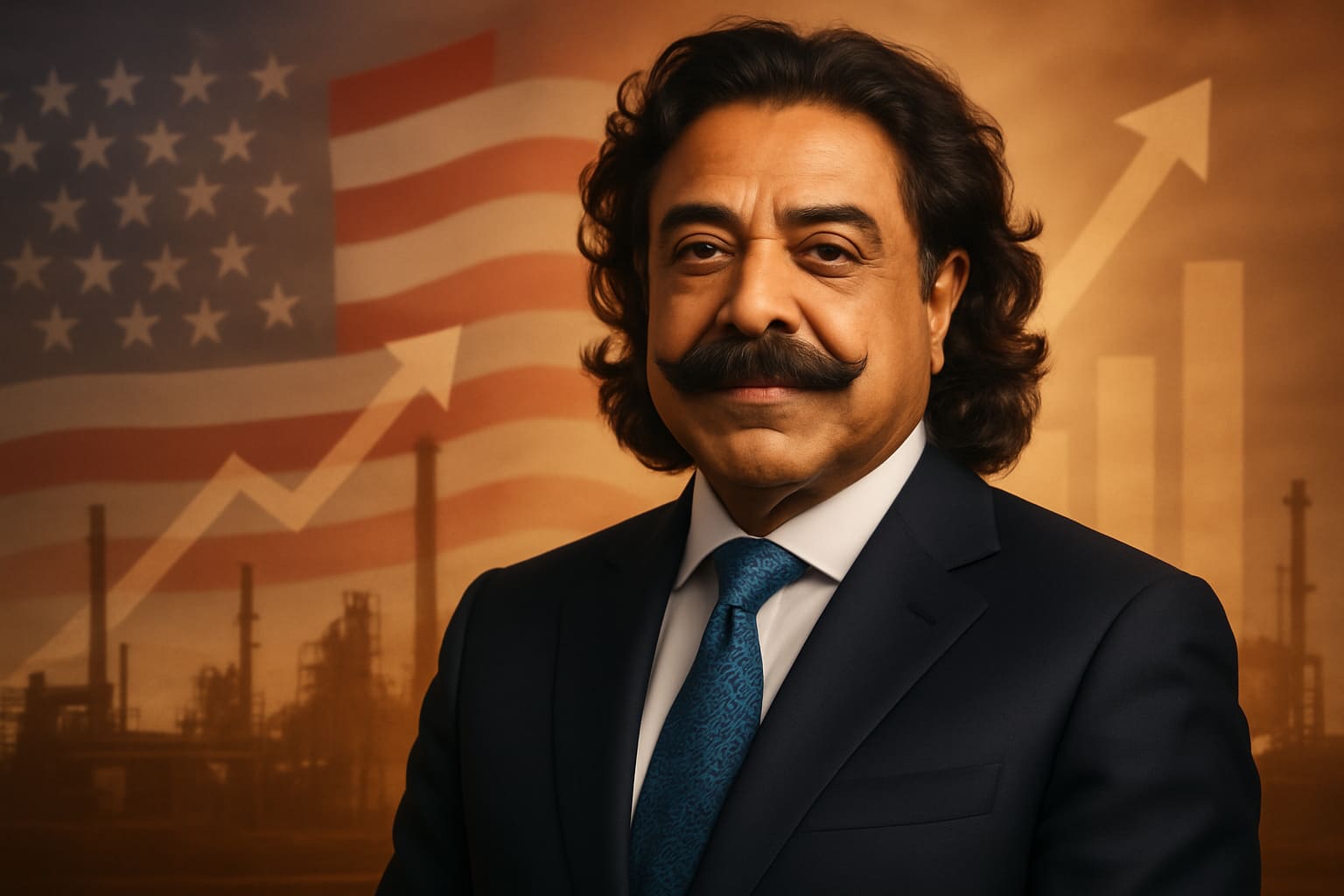Table of contents
Shahid Khan arrived in America with nothing but $500 in his pocket. He carried a dream that seemed impossible. Born in Lahore, Pakistan, this middle-class kid would transform himself. He became one of the most successful entrepreneurs in American history. His story represents the ultimate embodiment of the American Dream. It proves that with determination, innovation, and relentless hard work, anyone can rise. Anyone can rise from the humblest beginnings to extraordinary heights.
Khan stands as a testament to what’s possible in America today. With a net worth exceeding $13 billion, he owns the Jacksonville Jaguars NFL team. He also owns Fulham Football Club in England. He built Flex-N-Gate into a manufacturing empire worth billions. But his journey to the top was anything but easy. It was filled with challenges that would have broken lesser spirits.
Early Life & Struggles

Born on July 18, 1950, in Lahore, Pakistan, Shahid Khan grew up differently. He lived in a middle-class family that valued education and hard work. His father, Rafiq Khan, owned a small shop. The shop sold surveying and drawing equipment. His mother worked as a mathematics professor. The family was involved in the construction industry. This provided young Shahid with his first glimpse into engineering and manufacturing.
Life in 1950s Pakistan was challenging for middle-class families. Economic opportunities were limited. The political situation remained unstable following the country’s partition from India. The Khan family, like many others, struggled to make ends meet. They struggled despite their education and professional backgrounds. Shahid Khan’s parents recognized that their son’s future lay beyond Pakistan’s borders. Opportunities for advancement seemed increasingly scarce there.
The Difficult Decision
The decision to send their 16-year-old son to America was not made lightly. It represented an enormous financial sacrifice for the family. Rafiq Khan scraped together every penny he could. He took money from his small construction business to fund his son’s journey. The $500 they managed to gather represented a fortune by Pakistani standards. Yet it would prove woefully inadequate for life in America.
When Shahid Khan boarded the plane to America in 1967, he carried more than luggage.He carried his family’s life savings. Along with that, he carried their hopes and dreams. Everything familiar was left behind—his family, his culture, his language. All of it, he gave up to pursue an engineering degree at the University of Illinois. The weight of expectation was enormous. But so was his determination to succeed.
Arrival in America

The journey to America was Shahid Khan’s first taste of the challenges ahead. Arriving in the middle of a brutal Illinois winter, he found himself completely unprepared. He was unprepared for the harsh reality of American life. The university dormitories hadn’t opened yet. This left him stranded in a foreign country with nowhere to stay. The temperature was below freezing. Snow covered everything as far as he could see.
With no other options, Shahid Khan made his way to the local YMCA. He spent his first night in America there. The room cost $2, and a meal added another dollar to his expenses. In a single day, he had spent $3 of his precious $500. This was an astronomical sum. It represented nearly a week’s wages for most people back in Pakistan. As he lay in that small YMCA room, listening to the wind howl outside, Shahid must have wondered. He must have wondered if he had made a terrible mistake.
The First Breakthrough
The next morning brought both despair and hope. Wandering down to the YMCA kitchen, Shahid Khan discovered something. This discovery would change his perspective forever. He could earn $1.20 per hour washing dishes. This was more money than 99% of people in Pakistan could dream of making. “It’s like, wow,” Khan would later recall. “If you put the $1.20 per hour in terms of Pakistan, you’re making more than 99% of the people over there. I’m breathing oxygen for the first time.”
This revelation marked the beginning of Shahid Khan’s transformation. He transformed from a scared teenager into a determined entrepreneur. With fierce dedication, he threw himself into dishwashing. That same intensity would later fuel the rise of his business empire. Every plate he cleaned, every pot he scrubbed, brought him closer to his goal. His goal was earning an engineering degree and building a better life.
Turning Points
Shahid Khan’s first major turning point came when he fully embraced American culture. He did this while maintaining his Pakistani identity. He joined the Beta Theta Pi fraternity. This experience taught him valuable lessons about networking, leadership, and American social dynamics. This wasn’t just about fitting in. It was about understanding how success worked in his adopted country.
During his college years, Shahid Khan met Ann Carlson. She would become his wife and lifelong partner. Their relationship represented another crucial turning point. Ann provided emotional support and helped him navigate American culture. They dated for ten years before marrying in 1977. This was a testament to their deep commitment to each other. It showed their shared vision of the future.
Academic Excellence

Academically, Shahid Khan excelled in his industrial engineering studies. His mathematical background served him well. He inherited this from his professor mother. It helped him in the technical coursework. But more importantly, he began to see engineering differently. He saw it not just as a profession, but as a tool for innovation and problem-solving. This perspective would prove crucial in his later business ventures.
The most significant turning point came when Shahid Khan landed a job at Flex-N-Gate. He got this job while still in college. This local automotive parts company manufactured bumpers through an incredibly inefficient process. They welded together as many as 15 individual pieces to create a single bumper. For an engineering student with fresh eyes and innovative thinking, the waste and inefficiency were obvious.
Learning the Business
Working at Flex-N-Gate exposed Shahid Khan to the automotive industry’s inner workings. He learned about supply chains, manufacturing processes, quality control, and customer relationships. More importantly, he began to understand the industry’s problems and limitations. The aftermarket parts business, where Flex-N-Gate operated, was particularly challenging. Customers prioritized low prices over innovation or quality.
After graduating with his Bachelor of Science in Industrial Engineering in 1971, Shahid Khan was hired. He became an engineering manager at Flex-N-Gate. This promotion represented validation of his abilities. It provided him with greater responsibility and insight into the business. For the next seven years, he worked tirelessly. He worked to improve production processes and reduce complexity.
Revolutionary Innovation
During this period, Shahid Khan developed his revolutionary bumper design. Instead of welding together multiple pieces, he created a process. This process stamped bumpers from a single piece of steel. This innovation dramatically reduced weight, improved strength, and streamlined manufacturing. The new design was particularly valuable for pickup trucks. These trucks needed to meet increasingly strict fuel economy requirements.
However, Shahid Khan quickly realized something important. His innovation was wasted in the aftermarket business. Customers buying replacement parts didn’t care about weight savings or advanced engineering. They just wanted the cheapest option available. To truly capitalize on his invention, he would need to sell directly to automakers. These companies valued innovation and efficiency.
Breakthrough Success

This realization led to perhaps the most crucial turning point in Shahid Khan’s life. He made the decision to leave Flex-N-Gate and start his own company. It was an enormous risk. He was giving up a steady job and comfortable salary. He was venturing into the unknown world of entrepreneurship. With nothing more than a P.O. box, a small business loan, and unwavering determination, Shahid Khan founded Bumper Works in 1978.
The early days of Bumper Works were both exhilarating and terrifying. Shahid Khan’s innovative bumper design immediately attracted attention from major automakers. General Motors was importing an Isuzu pickup truck called the Chevy LUV. This truck was overweight and needed Shahid’s lighter bumper to meet specifications. Chrysler faced similar challenges with its Mitsubishi-made Dodge D50. Both companies became early customers. This provided crucial validation for Shahid Khan’s business model.
Legal Challenges
Just as Bumper Works was gaining momentum, disaster struck. Flex-N-Gate sued Shahid Khan for allegedly stealing trade secrets. They also accused him of breaching his fiduciary duty. The lawsuit threatened to destroy his fledgling company before it could establish itself. An injunction would have prevented him from selling his products. This would have effectively killed Bumper Works.
With limited financial resources, Shahid Khan couldn’t afford top-tier legal representation. Instead, he hired the cheapest lawyer he could find. He essentially ran his own defense. This meant spending his days overseeing production in Danville. He spent his nights in the law library at the University of Illinois. He researched legal precedents and prepared arguments.
Victory and Acquisition
For two years, the lawsuit hung over Shahid Khan’s head like a sword of Damocles. Despite winning round after round in court, he lived with constant uncertainty. He was uncertain about his company’s future. Lesser entrepreneurs might have settled to avoid the stress and expense. But Shahid Khan refused to give up. He believed in his innovation and his right to compete fairly in the marketplace.
The legal battle finally ended in 1980. The Illinois Supreme Court refused to hear Flex-N-Gate’s second appeal. Shahid Khan had won completely, but the victory came with an unexpected opportunity. Flex-N-Gate, his former employer, was losing $50,000 per month. The company was facing bankruptcy. In a stunning reversal of fortune, Shahid Khan bought the company that had tried to destroy him. He paid only the book value of its assets.
Key Business Moves
This acquisition marked the beginning of Shahid Khan’s transformation. He transformed from small entrepreneur to major industry player. By combining Bumper Works with Flex-N-Gate, he created a more substantial operation. This operation had greater manufacturing capacity and customer relationships. More importantly, he gained valuable experience in corporate acquisitions and business integration.
The real breakthrough came in 1984 when Shahid Khan secured his first contract with Toyota. Initially, the deal was modest. He supplied a small number of bumpers for Toyota pickup trucks. But this relationship would prove to be the foundation of his empire. Toyota was different from American automakers. They valued innovation, quality, and continuous improvement. These principles aligned perfectly with Shahid Khan’s engineering mindset.
Toyota Partnership Growth

The partnership with Toyota grew rapidly. By 1987, Flex-N-Gate had become the sole supplier of bumpers for Toyota pickup trucks. Two years later, in 1989, the company was supplying bumpers for Toyota’s entire American product line. This exclusive relationship provided the stability and volume necessary for massive growth.
Shahid Khan’s success with Toyota wasn’t accidental. He embraced the Toyota Production System, also known as “the Toyota Way.” This system emphasized efficiency, quality, and continuous improvement. This philosophy transformed Flex-N-Gate’s operations. It enabled the company to change its manufacturing processes within minutes rather than hours or days. The flexibility and responsiveness this provided made Flex-N-Gate an invaluable partner. It became invaluable to Toyota and other automakers.
Jacksonville Connection
The relationship with Southeast Toyota, based in Jacksonville, Florida, proved particularly crucial. In the mid-1980s, Japanese automakers were importing vehicles without accessories. These accessories included bumpers, air conditioners, and radios. These components were installed at American ports to meet local consumer preferences. Shahid Khan’s company became a key supplier for this process. They shipped thousands of bumpers annually to Jacksonville.
The business relationship with Southeast Toyota executives Bob Arnett and Bob France illustrated something important. It showed Shahid Khan’s unique approach to sales and customer service. Unlike typical sales representatives who made grand promises, Shahid Khan was an engineer. He delivered exactly what he promised. “What he talked about, that’s what you got,” France recalled. This reliability and honesty built trust that lasted for decades.
Business Adaptation
As Japanese automakers began building manufacturing plants in America, the demand for port-installed accessories declined. However, Shahid Khan successfully transitioned Flex-N-Gate’s contracts. He arranged to supply bumpers directly to Toyota’s American factories. This adaptability demonstrated his ability to evolve with changing market conditions. It showed his ability to maintain crucial customer relationships.
Throughout the 1990s and 2000s, Shahid Khan made a series of strategic decisions. These decisions transformed Flex-N-Gate from a regional supplier into a global manufacturing powerhouse. His approach combined organic growth with strategic acquisitions. He always focused on innovation and customer service.
Global Expansion

One of Shahid Khan’s most important business moves was geographic expansion. Rather than concentrating all operations in Illinois, he established manufacturing plants closer to his customers’ facilities. This strategy reduced transportation costs, improved delivery times, and strengthened customer relationships. By 2019, Flex-N-Gate operated 69 manufacturing plants. These plants were located across the United States, China, Argentina, Spain, France, Germany, Mexico, and Canada.
The company’s growth was staggering. From $17 million in sales when Shahid Khan bought Flex-N-Gate, revenues grew dramatically. They reached $2 billion by 2010 and $8.89 billion by 2020. This represented a compound annual growth rate that few companies in any industry could match. By 2020, Forbes ranked Flex-N-Gate as the 46th largest privately held American company.
Sports Ownership
In 2010, Shahid Khan made his first attempt to enter professional sports ownership. He bid for the St. Louis Rams. Although Stan Kroenke ultimately exercised his right to match Shahid Khan’s offer, this experience provided valuable insights. He gained insights into sports franchise ownership and the NFL’s approval process.
The failed Rams bid led to an even better opportunity. In November 2011, Shahid Khan agreed to purchase the Jacksonville Jaguars from Wayne Weaver. The purchase price was $770 million. The deal was particularly meaningful because Jacksonville had been crucial to Flex-N-Gate’s early success. This was through the Southeast Toyota relationship.
Legacy & Lessons Learned

Becoming an NFL owner represented more than a business investment for Shahid Khan. It was a statement about his place in American society. It showed his commitment to giving back to communities that had supported his success. The Jaguars purchase made him the first ethnic minority owner in NFL history. This broke an important barrier in American sports.
Shahid Khan’s approach to sports ownership reflected his business philosophy. Rather than seeking immediate returns, he focused on long-term value creation. He invested in stadium improvements, community programs, and team development. He understood that success in sports, like manufacturing, requires patience and sustained effort.
Philanthropic Impact
Shahid Khan’s legacy extends far beyond his business success and personal wealth. His story represents the power of the American Dream. It represents the opportunities available to those willing to work for them. From a scared teenager washing dishes in a YMCA kitchen to a billionaire business owner, his journey inspires millions. It inspires immigrants and entrepreneurs worldwide.
One of the most important lessons from Shahid Khan’s story is the value of persistence. When Flex-N-Gate sued him, he could have settled and avoided years of legal battles. Instead, he fought for his principles and ultimately emerged stronger. This willingness to endure short-term pain for long-term gain characterizes many of his most important decisions.
Innovation Philosophy
Shahid Khan’s approach to innovation provides another crucial lesson. His revolutionary bumper design succeeded not because it was technically complex. It succeeded because it solved real problems for customers. The best innovations often come from simplifying existing processes rather than adding complexity. His engineering background taught him to focus on practical solutions rather than theoretical perfection.
The importance of customer relationships permeates every aspect of Shahid Khan’s success. His partnership with Toyota lasted decades because he consistently delivered on his promises. He adapted to changing needs. In an era of short-term thinking and quarterly earnings pressure, Shahid Khan’s long-term approach to customer service created sustainable competitive advantages.
Giving Back
Shahid Khan’s philanthropic efforts demonstrate his commitment to giving back. He gives back to the communities that supported his success. His $10 million donation to the University of Illinois funded the Khan Annex. This building houses the Center on Health, Aging, and Disability. This gift recognized the crucial role education played in his own success. It provided opportunities for future generations.
The Shahid and Ann Khan Foundation supports education, youth programs, arts, health initiatives, and community development. Their work spans Jacksonville and beyond. Their $5 million investment in the Museum of Science and History’s capital campaign exemplifies their commitment. They are committed to educational institutions that inspire young people. These institutions encourage careers in science and engineering.
Economic Impact
Through his various business ventures and philanthropic activities, Shahid Khan has created thousands of jobs. He has contributed billions of dollars to the American economy. Flex-N-Gate alone employs over 25,000 people worldwide. This provides stable, well-paying manufacturing jobs in an era when such opportunities are increasingly rare.
Shahid Khan’s success also challenges stereotypes about immigrants and their contributions to American society. Rather than taking jobs from American workers, he created an entire industry ecosystem. This ecosystem supports thousands of families. His story demonstrates that skilled, motivated immigrants are job creators, not job takers.
Lessons for Entrepreneurs
The lessons from Shahid Khan’s journey apply to entrepreneurs in any industry. His focus on solving real problems, building strong customer relationships, maintaining high quality standards, and thinking long-term provides a blueprint. This blueprint is for sustainable business success. His willingness to take calculated risks while maintaining financial discipline shows something important. It shows how to grow aggressively without jeopardizing the business foundation.
Perhaps most importantly, Shahid Khan’s story shows that success in America is still possible. It’s possible for those willing to work for it. In an era of increasing inequality and economic uncertainty, his journey from dishwasher to billionaire proves something. It proves that the American Dream remains alive for those with the courage to pursue it.
Continuing Legacy

His legacy will continue through his children, particularly his son Tony Khan. Tony has already achieved success in sports entertainment and wrestling promotion. The Khan family’s continued involvement in business, sports, and philanthropy ensures something important. It ensures that Shahid Khan’s values and vision will influence future generations.
For aspiring entrepreneurs, Shahid Khan’s story offers both inspiration and practical guidance. Success requires more than just good ideas. It demands persistence, adaptability, customer focus, and the courage to take calculated risks. Most importantly, it requires the willingness to start small and think big. This is just as Shahid Khan did when he left his dishwashing job to pursue his engineering dreams.
Shahid Khan continues to lead Flex-N-Gate and his various sports franchises today. His story serves as a powerful reminder of what’s possible in America. From a $500 beginning to a $13 billion empire, his journey proves something important. It proves that with determination, innovation, and hard work, anyone can achieve extraordinary success. His legacy will inspire entrepreneurs and immigrants for generations to come. It shows that the American Dream is not just a concept, but a reality. It’s a reality for those bold enough to pursue it.
- From Housing Projects to Fortune 500: The Extraordinary Rise of Ursula Burns
- From $11,000 to Billions: The Extraordinary Journey of Do Won Chang & Jin Sook Chang
- From Orphanage to Empire: The Leonardo Del Vecchio Story
- From Poverty to Global Empire: The Extraordinary Journey of Ingvar Kamprad
- From Poverty to Polo: The Extraordinary Rags-to-Riches Journey of Ralph Lauren
This article was originally published on The Phoenix Ascent, your premier destination for inspiring rags-to-riches stories of real-life entrepreneurs and visionaries. For more incredible success stories, visit our website and discover how ordinary people achieved extraordinary success.
Learn more about Shahid Khan’s business empire at Wikipedia for additional details about his remarkable journey from Pakistan to American business success.

